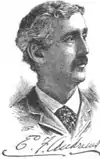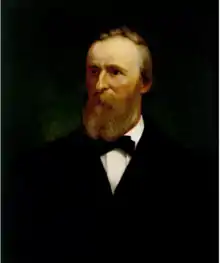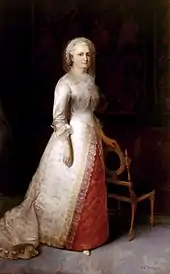Eliphalet Frazer Andrews
Eliphalet Frazer Andrews (June 11, 1835 – March 15, 1915), an American painter known primarily as a portraitist, established an art instruction curriculum at the behest of William Wilson Corcoran at his Corcoran School of Art, and served as its director, 1877–1902. He received many commissions to create both original portraits and copies of images of deceased famous Americans, which are displayed by federal, state, and local institutions. His art is housed at the Smithsonian American Art Museum,[1] the Ohio State Capitol,[2] and numerous paintings at The White House[3] and the United States Capitol.[4]
Eliphalet Frazer Andrews | |
|---|---|
 | |
| Born | June 8, 1835 |
| Died | March 15, 1915 (aged 79) |
| Resting place | Union Cemetery |
| Known for | painting |
| Spouse(s) | Marietta Fauntleroy Minnigerode |
Early life
Born in Steubenville, Ohio, to Dr. Alexander Hull[5] and Eliza Ann (Frazer) Andrews,[6] he received early training at Marietta College in Ohio, and further study in the Royal Prussian Academy, Berlin, in the atelier of Ludwig Knaus, at the Düsseldorf Academy and with Leon Bonnat at the Ecole des Beaux-Arts, Paris.[7]
Career


Following the election of his friend Rutherford B. Hayes as President[8] Andrews moved to Washington, D.C.[9]
William Wilson Corcoran hired Andrews to establish an art instruction curriculum at his Corcoran School of Art. Andrews served as its director, 1877–1902, and later as the Corcoran Art Gallery until his death. Pupils included Catharine Carter Critcher[10] and Daisy Blanche King.[11]

Several federal government agencies, mostly through the Architect of the Capitol, Edward Clark, commissioned Andrews to make copies of existing portraits.[9] Thus, several of his portraits, are in The White House collection, including posthumous full-length portraits of Martha Washington (illustration), Thomas Jefferson and Andrew Johnson.[12] His Poppies[13] and Edge of a Stream[14] are at the Smithsonian American Art Museum.
Former Kentucky Lieutenant Governor John C. Underwood, President of the United Confederate Veterans, commissioned Andrews to make twenty portraits of prominent Confederates for a proposed Confederate Museum in Richmond, Virginia.[15] The project was embroiled in litigation, and eleven paintings were sold in 1910 for unpaid storage fees by a Covington, Kentucky warehouse. Most ended up in Virginia (such as that of Gen. Robert E. Lee in the Westmoreland County Courthouse), but three are in the collection of the Kentucky Museum at Western Kentucky University.[16] The Confederate Memorial Association, led by Virginia lieutenant governor James Taylor Ellyson and financed by Thomas Fortune Ryan did build its headquarters (the Confederate Memorial Institute a/k/a "Battle Abbey") in Richmond, which is now the Virginia Historical Society. Perhaps the most famous paintings therein are the "Four Seasons of the Confederacy" murals by Charles Hoffbauer.
Clarance Randolph Howard,[17] son of Major William Key Howard[18] of the Confederate States of America, great-grand-nephew of Francis Scott Key, and great-grandson of John Eager Howard[19] (U.S. Senator and Governor of Maryland), commissioned Eliphalet Frazer Andrews to complete a portrait of his wife (shown here), Mary French Howard, in 1908. This is one of the few known remaining original portraits by the artist of a non-political or military official.
Personal life
In 1895 Andrews married Marietta Fauntleroy Minnigerode (1869–1932). She was the daughter of Charles Ernest Frederick Minnigerode (1816–1891), rector of St. Paul's Church in Richmond, Virginia, and she was active in the Daughters of the Confederacy. E. F. Andrews was a member of the Metropolitan Club in Washington, D.C.
Death and legacy
Andrews died in Washington, D.C. on March 15, 1915, and his remains were returned to Steubenville, Ohio.[20] In 1917, his widow presented his portrait of Confederate General Nathan Bedford Forrest to the Confederate Memorial in Chattanooga, Tennessee.[21][22]
Notes
- "Eliphalet Fraser Andrews | Smithsonian American Art Museum". americanart.si.edu. Retrieved December 29, 2020.
- "Andrews, Eliphalet Frazer, 1835-1915 - Eliphalet Frazer Andrews E.F. Andrews". Retrieved December 29, 2020.
- "First Lady Portraits". WHHA (en-US). Retrieved December 29, 2020.
- "U.S. Senate: John Adams". www.senate.gov. Retrieved December 29, 2020.
- "A physician at Columbus"(Ohio State House: Governor Portraits: Governor Charles Foster, 1884) Archived 2016-03-04 at the Wayback Machine).
- Who's Who in America, 1910–11
- "Fine Art Dealers Association: Eliphalet Frazer Andrews, noting E. Benezit and Who was Who in American Art". Archived from the original on July 8, 2015. Retrieved June 2, 2012.
- Andrews' bust-length portrait of Hayes, at the Corcoran Gallery of Art, was lent to an exhibition, "Mr President" at the Dallas Museum of Fine Arts, 1956.
- "U.S. Senate: Adams, John". senate.gov. June 24, 2015. Retrieved July 7, 2015.
- David Bernard Dearinger; National Academy of Design (U.S.) (2004). Paintings and Sculpture in the Collection of the National Academy of Design: 1826–1925. Hudson Hills. pp. 20–. ISBN 978-1-55595-029-3.
- Virgil E. McMahan (1995). The Artists of Washington, D.C., 1796–1996. Artists of Washington. ISBN 978-0-9649101-0-2.
- The White House Historical Association; further portraits at the White House mentioned in Who's Who in America, 1910–11: Andrew Jackson, Zachary Taylor, James Buchanan, Andrew Johnson, and James A. Garfield.
- "Poppies | Smithsonian American Art Museum". americanart.si.edu. Retrieved December 29, 2020.
- "American Art Museum: Edge of a Stream". Archived from the original on December 15, 2012. Retrieved June 2, 2012.
- Veterans, United Confederate (April 17, 2018). "Minutes of the ... Annual Meeting and Reunion of the United Confederate Veterans ..." Retrieved April 17, 2018 – via Google Books.
- Kleber, John E. (January 13, 2015). The Kentucky Encyclopedia. University Press of Kentucky. ISBN 9780813159010. Retrieved April 17, 2018 – via Google Books.
- Virginia Military Institute, Cadet photo, 1892, http://digitalcollections.vmi.edu/digital/collection/p15821coll7/id/2349
- "Maj William Key Howard (1829-1899) - Find A Grave..." www.findagrave.com. Retrieved December 29, 2020.
- "John Eager Howard (1752-1827) - Find A Grave..." www.findagrave.com. Retrieved December 29, 2020.
- findagrave no.7611269.
- Washington Times June 3, 1917
- Confederacy, United Daughters of the (April 17, 2018). "Minutes of the Annual Convention". Post Publishing Company. Retrieved April 17, 2018 – via Google Books.